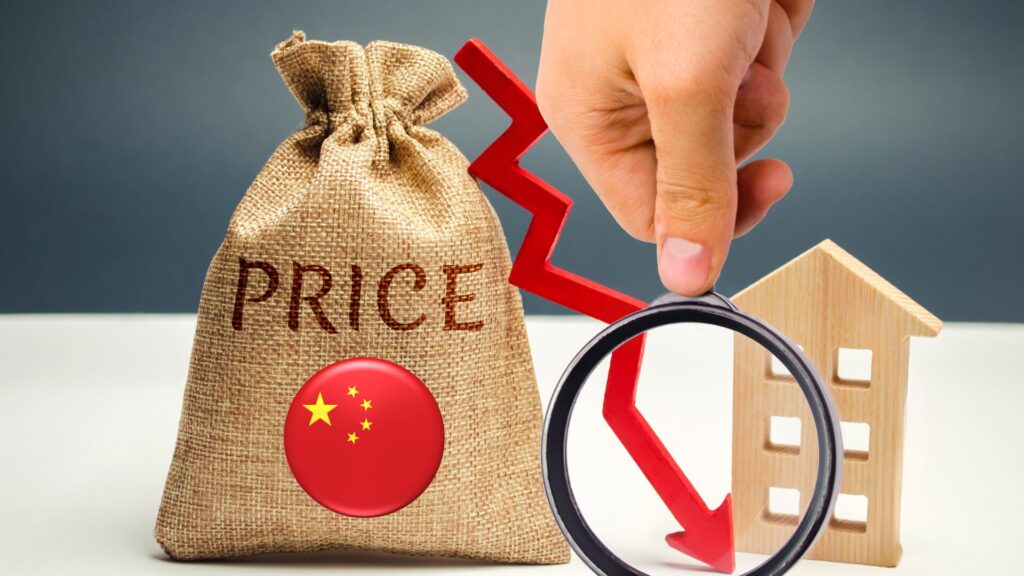China Factory Prices are Falling: How to Get Yours
The Plight of Chinese Factories
In China’s tumbling prices push some exporters to the brink, Reuters News wrote about something the international manufacturing lawyers at my law firm have been seeing for quite some time now. Desperate Chinese factories are lowering their prices, and most Chinese factories are desperate right now. My firm’s international manufacturing lawyers have observed a trend consistent with these findings: a significant number of Chinese factories are reducing their prices in a bid to remain competitive. This phenomenon is not isolated but reflects a broader state of urgency within China’s manufacturing sector and, indeed, in China’s economy at large. See e.g., Chinese prices deflate amid wider pressures on the economy and China to export deflation to the world as economy stumbles, from The Hill and the Financial Times today.
Navigating China Product Price Negotiations
Is the situation dire for every Chinese factory? Not all. But a substantial number of Chinese factories find themselves compelled to negotiate lower prices, and many of our clients that get their products from Chinese factories have negotiated meaningful reductions in product costs. This success rate underscores a widespread willingness among Chinese manufacturers to adjust prices, reflecting the pressures of their increasingly tough economic environment and their own desperation.
China Product Prices Have Been Falling for 15 Straight Months
As the Reuters article notes: China “producer prices have been falling for 15 straight months, crushing profit margins to the point where industrial output and jobs are now at risk and compounding China’s economic woes, which include a property crisis and a debt crunch. There is no disputing that China’s economy is in deep trouble and its unemployment rate is high and still rising. And in the face of this, the CCP has done what it has always done whenever its economy is weakening: it increases subsidies to Chinese manufacturers to allow them to stay in business and avoid terminating their employees.
But with it becoming increasingly easy for foreign product buyers to move their product buying outside China, and with Chinese factories increasingly moving their production outside China as well, the Chinese government subsidies and the price drops those subsidies allow are larger than they have ever been.
We have clients that have successfully negotiated discounts of 25% or more with their Chinese suppliers, often by proposing increased purchase volumes or by extending contract terms. We also have clients who have secured substantial price reductions unconditionally, with Chinese manufacturers quickly agreeing to price cuts of 10% to 20% without requiring additional commitments.

The Risks in Negotiating Product Prices with Chinese Factories
The Reuters article leads with the story of a Chinese manufacturer that cut prices to the point where it would lose money on every sale but did so to avoid having to immediately shut down the company and terminate all its employees. This Chinese manufacturer likely chose to sell at a loss because it believes the CCP will keep increasing subsidies to the point that it can again be profitable.
Per Reuters, and per exactly what our China manufacturing lawyers have been seeing in China:
“Companies cut product prices, then staff salaries. Then consumers won’t buy – this could be a vicious cycle,” he said. Profits at China’s industrial firms fell 2.3% last year, adding to the 4% drop in COVID-hit 2022. An official survey showed manufacturing activity contracting for a fourth straight month in January, while export orders shrank for a 10th month.
For Lin [a Chinese factory owner], that has meant the $1.5 million order his client placed was 25% below a similar one last year. It was 10% below production cost.”
The China Desperation Price
Think about the above for just a moment. A foreign product buyer was able to get product for $1.5 million that cost its Chinese manufacturer $1.65 million to produce. In other words, it was able to buy product from a Chinese manufacturer at less than it costs its Chinese factory to make it. Low prices from China have for decades been referred to as “The China Price” but what should we call product prices that are below the cost to manufacture the product? I’ve started calling it the China Desperation Price.

Now is The Time to Lower Your China Product Costs
If you’re thinking it’s time you got a similar price reduction from your Chinese factory, all I can say is, well yeah.
But Negotiating Lower Prices from Chinese Factories is Risky
Negotiating for lower prices with your Chinese manufacturing partners requires you tread carefully. Chinese factory owners are feeling the pressure of losing customers to other countries and they have become increasingly cautious of foreign companies moving their production elsewhere. Any hint that you may take your business to another country if your prices are not lowered can put your operations at risk.
If you approach your Chinese factory with an ultimatum — such as insisting on a 40% price reduction or threatening to go elsewhere with your business — you could trigger a damaging response from your Chinese factory. Chinese factories, wary of losing more business, could interpret this as a sign that you are already on your way out of China, which can complicate your relationship and your negotiations.
In How to Move Your Manufacturing Out of China Safely we wrote about the risks that often befell foreign companies when it becomes known that they plan to leave China:
Though China may seem safe, one should not write off the possibility of violence in one’s business dealings in China. My law firm has helped about a dozen foreign companies navigate their way out of situations where violence was threatened or occurred. We tell our clients that if they owe money to a Chinese company or are involved in any sort of dispute with anyone in China (partner, employee, etc.), they should avoid meeting to discuss the dispute/problem anywhere other than in a neutral, very public place in the day time and they should — if at all possible — not go to China or remain in China so long as that dispute might be pending.
In a similar vein, we have also written extensively on why you must plan for terminating your China supplier. And by plan, we mean make sure you have secured your molds and all your paid-for product before you do anything that might tip off your China supplier regarding your plan to start manufacturing elsewhere.
It is common for Chinese manufacturers to retaliate against foreign product buyers that cease buying product from them. For this reason, we instruct our clients to line up new suppliers and have them ready to go before they even hint about ceasing production with their existing China suppliers.
Our China manufacturing lawyers have repeatedly seen the following:
- Foreign company tells its China manufacturer it will be ceasing to use it for its production. China manufacturer then keeps all the foreign company’s tooling and molds, claiming to own them. Prevention Tips: The way to prevent this is to get an agreement from your Chinese manufacturer making clear you own the tooling and molds before your Chinese manufacturer has any inkling you will be moving on. For more on the importance of mold agreements, check out On the Importance of China Mold Ownership and Protection Agreements.
- U.S. company seeks a price reduction and tells its China manufacturer that if it doesn’t get the price reduction it will consider moving its manufacturing from China to Mexico and Thailand. The U.S. company eventually learns that someone in China registered its brand names and logos as trademarks in Mexico and Thailand. U.S. company is no longer able to have its product with its own brand name and logo manufactured in Mexico or Thailand. Prevention Tips: The way to prevent this is to register your brand names and logos in the country to which you will be moving your manufacturing before anyone knows that you might be manufacturing in those countries. You might even want to consider doing these registrations under a company name that will not tip anyone off to your plans to leave China.
- U.S. company comes to us after having told its China manufacturer that it would need to add an additional manufacturer because it needed much greater production capabilities. The China manufacturer responded by saying that “we own the China trademarks to your products and the China patent to your product designs and if anyone else in China tries to make your products, we will get an injunction to stop them from doing so and another injunction to stop any of your products from leaving China.” SIX lawsuits later the warring companies reached a settlement. Prevention Tips: For how to prevent this, see China Trademarks: Register Yours BEFORE You Do ANYTHING Else.
- Foreign company tells its China manufacturer it is looking to move its manufacturing out of China for tariff reasons. China manufacturer then says it will not be shipping any more product because foreign manufacturer is late on payment and owes it hundreds of thousands of dollars — none of which is true. China manufacturer reports foreign manufacturer to Sinosure (China’s government owned export insurance company) and Sinosure then ceases to insure any product sales to this foreign company. Having been placed on Sinosure’s notorious blacklist, the foreign company can no longer buy product from anyone in China on credit and perhaps even from any Chinese company in Vietnam or Mexico or anywhere else in the world. Calling in Sinosure is common, and our law firm handled roughly three times as many Sinosure matters in 2023 as in any prior year. Prevention Tips: Get written clarity regarding what you owe or might owe to Chinese companies before you start negotiating for lowering your product manufacturing prices.

The Broader Context of China Factory Negotiations
Navigating the complexities of negotiating price reductions from Chinese manufacturers requires understanding the broader context. The above stories regarding debt collection and hostage situations show that when there’s even a whisper of a foreign company considering a move away from their Chinese partners or exiting China altogether, a chain reaction can be set off.
Suddenly, you may find yourself confronted with unexpected claims: tax authorities present you with surprise levies, factories assert you owe them more than anticipated, you discover that your IP has been stolen and your products cannot leave China, and/or you receive invoices for materials or services such as molds, tooling, or design work that you were led to believe had already been paid. My personal favorite is when the Chinese factory seeks the $800,000 it claims you owe it for bad product that it had agreed to write off three years ago, largely because this one has become the dagger of choice in the last few years.
How to Safely Negotiate Lower Prices from Your China Factory
When discussing pricing with your Chinese factory, you need to plan strategically, communicate diplomatically, and prepare for any potential financial or other claims that may arise because of what your Chinese factory might assume to be the end of its business relationship with your company.
At least ten percent of the time when one of our clients goes to its China supplier to negotiate a lower price, the China supplier says something like “we are done manufacturing for you. We don’t need you anymore. We are selling our own products [which are actually YOUR products] direct now.”
To preemptively plan for such a scenario, especially for something as seemingly straightforward as a request for lower prices, here are some strategic steps to consider:
- Ensure that no representatives of your company are in China at the time you initiate the pricing discussion This denies your Chinese factory the ability to hold anyone hostage.
- Before raising the topic of price reductions, secure your intellectual property and physical assets, including molds, tooling, and any products you’ve already paid for. This move is to safeguard your resources from any pre-emptive actions your supplier might take upon suspecting a shift in your production strategy. You should also use your existing good relationship to get confirmations regarding ALL outstanding balances.
- Proactively identify and establish relationships with alternative suppliers, preferably in different regions, that can step in and ramp up production swiftly if necessary. This ensures you are not left without product supply should your negotiations with your current supplier falter.
Conclusion
The “China Desperation Price,” offers foreign companies a unique opportunity to renegotiate terms and secure lower prices. However, this opportunity comes with its caveats. The path to successfully negotiating with Chinese companies is always fraught with risks, from strained relationships with long-term partners to the extreme measures some factories take in the face of perceived threats to their business. As such, renegotiating your prices/contracts with Chinese manufacturers must be carefully calibrated, balancing assertiveness in pursuit of better terms with sensitivity to the broader economic and social context in which these factories operate.
This balance is not merely a matter of diplomatic negotiation but a strategic necessity. The stories and examples I cite in this post underscore the real risks involved in these negotiations, from hostage situations to retaliatory actions by suppliers. They should serve as a reminder that beyond the immediate goal of cost reduction lies the imperative of maintaining a stable, reliable supply chain.
Therefore, as you consider leveraging this moment to renegotiate your manufacturing costs, remember the importance of planning, diplomacy, and strategic foresight. Secure your intellectual property and assets, explore alternative supply options, and approach negotiations with a clear understanding of both your leverage and the potential consequences of your price reduction demands. By doing so, you can achieve both cost savings and long-term stability and success in your manufacturing endeavors.
Though the allure of the “China Desperation Price” is undeniable, it is the wisdom with which you pursue this opportunity that will determine your success. The strategic steps outlined above are more than just recommendations; they are essential practices for any company looking to thrive in the ever-changing world of international manufacturing.

























